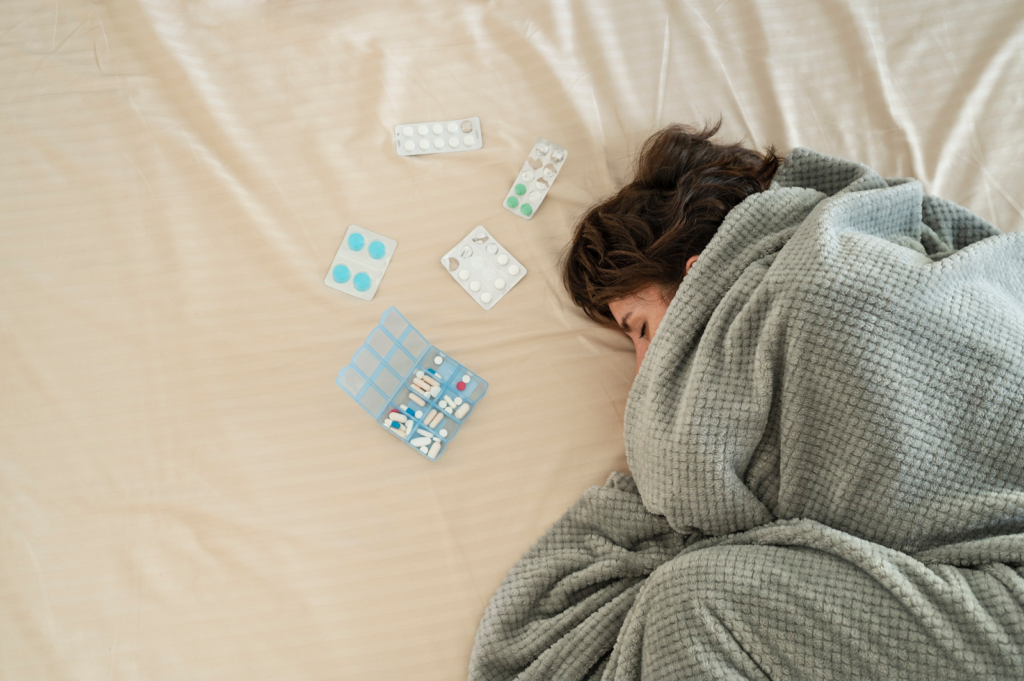Sexually transmitted diseases (STDs) can be a source of worry and anxiety for many individuals.
One common question that often arises is, “How long does it take to show STD symptoms?” This is why understanding the timeline for STD symptoms is crucial for early detection and seeking timely medical care.
In this article, we will provide clear and straightforward information on how long it typically takes for STD symptoms to appear.
General Timeframes for Common STDs

Before we discuss the timeline of various STD symptoms, it’s essential to note why early detection is crucial. Early diagnosis not only helps you get the appropriate treatment but also prevents the spread of the infection to others.
Now, different sexually transmitted diseases (STDs) have various timeframes in which symptoms can appear. Here is a general guide:
Chlamydia and Gonorrhea
Chlamydia and gonorrhea are two common STDs. Fortunately, both of these infections can be asymptomatic, meaning they may not show any symptoms at all. However, if symptoms do occur, they usually appear within 1 to 2 weeks after exposure.
These symptoms may include:
- Painful urination
- Unusual discharge from the genital area
- Abdominal pain for women
- Swelling and pain in the testicles for men
It’s important to note that some people may not experience any symptoms, so regular testing is crucial if you are sexually active.
Syphilis
Syphilis is another STD that can have varied symptoms. The time it takes for symptoms to show can range from 10 days to 3 months after exposure. The progression of syphilis occurs in stages:
- Primary stage: Within 10 to 90 days, a painless sore or ulcer known as a chancre may appear at the site of infection.
- Secondary stage: About 2 to 8 weeks later, you may experience rashes, fever, fatigue, and swollen lymph nodes.
- Latent stage: If left untreated, syphilis can enter a latent stage where no symptoms are present, but the infection persists.
- Tertiary stage: In some cases, severe complications can develop years later if syphilis remains untreated.
Early detection and treatment of syphilis are crucial to prevent long-term health problems.
Herpes (HSV)
Herpes, caused by the herpes simplex virus (HSV), can lead to painful sores or blisters in the genital or oral area. Symptoms of a first herpes outbreak usually occur within 2 to 12 days after exposure.
However, some people may not have noticeable symptoms, and the virus can remain dormant in the body. Recurrent outbreaks, if they occur, often have milder symptoms.
HIV
Human immunodeficiency virus (HIV) is known for its long incubation period. After exposure to HIV, it can take weeks to months for symptoms to appear, if they do at all. Common early symptoms may include:
- Fever
- Fatigue
- Swollen lymph nodes
However, HIV often progresses to AIDS without proper treatment, so regular testing is essential for early detection and management.
What to do if you notice STD Symptoms?

Person suffering from STD symptoms with antibiotics
Here are some tips on what to do if you notice symptoms of an STD:
- Seek Medical Advice
The first and most crucial step is to consult a healthcare professional. Schedule an appointment with your primary care physician, a gynaecologist, a urologist, or a sexual health clinic.
Be honest about your symptoms and sexual history to help the healthcare provider make an accurate diagnosis.
- Abstain from Sexual Activity
Refrain from any sexual activity until you have been evaluated and treated by a healthcare provider. This helps prevent the potential spread of the infection to others.
- Get Tested
If you haven’t been tested for STDs recently, your healthcare provider will likely recommend testing for various STDs, even if you suspect a specific one. Some STDs can have similar symptoms, so comprehensive testing is essential for an accurate diagnosis.
- Follow Treatment Recommendations
If your healthcare provider confirms an STD diagnosis, follow their treatment recommendations carefully. STDs may be treated with antibiotics (for bacterial infections like chlamydia, gonorrhea, and syphilis) or antiviral medications (for viral infections like herpes and HIV).
Finish the prescribed course of medication, even if symptoms improve before the medication is completed.
- Notify Sexual Partners
It’s crucial to inform your current and recent sexual partners about your STD diagnosis so they can get tested and, if necessary, seek treatment. This helps prevent further spread of the infection.
- Practice Safe Sex
After treatment, continue to practice safe sex by using condoms consistently and correctly. This can reduce the risk of reinfection or contracting other STDs.
- Follow-Up Testing
Depending on the STD and the treatment prescribed, your healthcare provider may recommend follow-up testing to ensure the infection has cleared. Follow their advice on when to return for testing.
- Preventive Measures
If you’ve had an STD, you may be at a higher risk of contracting other STDs in the future. Discuss preventive measures, such as vaccination (e.g., HPV and hepatitis B vaccines), with your healthcare provider.
- Emotional Support
Dealing with an STD diagnosis can be emotionally challenging. Seek support from friends, family, or a counselor if needed. There are also support groups and online resources available for individuals with STDs.
- Regular Check-Ups
Even after successfully treating an STD, it’s essential to maintain regular check-ups with your healthcare provider for ongoing sexual health monitoring and to discuss any concerns or questions you may have.
Conclusion
In summary, the answer to the question how long does it take to show STD symptoms can vary depending on the specific infection. Some STDs may manifest within days, while others can remain asymptomatic for an extended period.
Regardless of symptoms, regular testing and safe sexual practices are crucial to prevent the spread of STDs and ensure early diagnosis and treatment. If you suspect you may have been exposed to an STD, it’s essential to consult a healthcare professional for testing and guidance on the next steps. Remember, accurate information and timely action can help protect your health and the health of your partners.